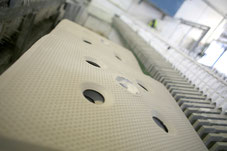- deutsch
- english
- contact
Industial Application


The Westerwald is host to the largest and most valuable deposit of speciality clays in the World, for every type of ceramic application. So it is no surprise that Witgert supplies all branches of traditional ceramics, as well as Technical Ceramics and non-ceramic application areas. Customers include manufacturers of wall- and floor-tiles, roof-tiles, backing bricks, facing bricks and clinkers, sanitary- and tableware, stove tiles, electroceramics, abrasives, refractories and Technical Ceramics, building materials and colorants.
In most cases customer-specific blends are developed in our own laboratory, in order to take particular user-requirements into account. Clays and clay-blends can be delivered in all forms: shredded, milled, roller milled, granulated, plastic and slurried.
The company sells all end and intermediate products. It is capable of supplying clays and bodies in the following forms:
- Clays and clay mixtures, shredded
- Clays, clay mixtures and bodies, rolled into flakes
- Clays, clay mixtures and bodies, ground into powder
- Clays, clay mixtures and bodies, ground and granulated
- Bodies, liquid in the form of slip
- Bodies,plastic in the form of filter cakes
- Bodies, vacuum-extruded into clots or sheets, also with chamotte
- Bodies, spray-dried into spray granulate



treatment technology
Witgert is the only clay mining company in Westerwald to operate its own semi-wet processing line and, using this method,markets 5,000 t of flakes per month with a thickness of <500 µm. It is also capable of producing superfine shreds to an edge length of < 8 mm.Superfine shredded clays are used as an additive in the simple processing systems of manufacturers of heavy clay ceramics (roof tiles, facing brick, refractory materials), while superfine shredded bodies are used in cast fine ceramics processes (sanitaryware, tableware and decorative ceramics, stove tiles). The high specific surface permits the uniform mixing of preground hard materials such as chamotte, feldspar, calcite, talcum, etc. Flakes are usually used as complete body, thus bypassing the entire processing step on the customers’ site.With the addition of water, it can be poured straight into the dual-shaft mixing section of the vacuum unit. This makes their use particularly interesting in special colours for roof tiles, facing bricks,unglazed floor tiles and plant vessels. Special applications such as advanced ceramics or non-ceramic applications are also served with flakes.


Wide transport network
The raw materials are shipped by truck ex works or pit,by rail from the Meudt station,and by ship from nearby Bendorf harbour on the Rhine.About 50 % of total output makes its way abroad via this route – mainly to Central Europe but also to Asia and Africa.



